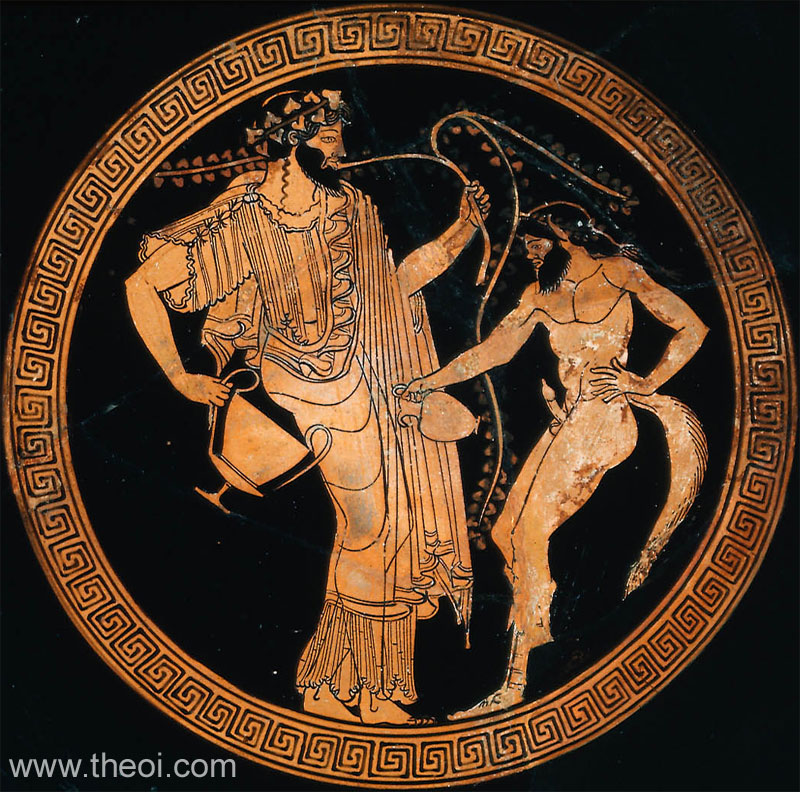Dionysus was one of
the lesser gods, but still very important. He was the god of fertility and
wine. He was the creator of wine. Dionysus can either bring extreme happiness
and joy or extreme rage and displeasure; “Thus reflecting both sides of wines
nature” (Greek Mythology.com). He was also the god of the strange and
uncontrollable powers of nature, and later became associated with wine later on
(Dionysus).
http://www.theoi.com/image/K12.6Dionysos.jpg
Dionysus is the son of Zeus and Semele. Semele was a human
woman that Zeus appeared to in the middle of the night in a hidden form. Semele
knew that the person she slept with was indeed a god; however, she had no idea
which god she had slept with. They slept together, and soon news spread to
Hera. She was extremely angry, and so she decided to spite the two lovers. She
told Semele that she should insist on seeing who her true lover was. So
eventually Zeus came back to Semele because he was madly in love with her.
Semele made Zeus swear an oath that he would show her his true form; he did so and
the woman died the moment she laid eyes upon him. Thankfully, Zeus knew that
Dionysus was inside her and he took him and sewed him into his thigh until he
was ready to be born. This granted him immortality. Dionysus is the only god
who has a human parent. However, Hera was still despised this child so much
because he was not hers, she forced the Titans to kill him. They ripped him to
pieces, but he was then brought back to life by Rhea and handed over to the
nymphs for protection (Greek Mythology.com). After living with the mountain
nymphs he became extremely powerful with nature
This resurrection from death is one of the most important
parts of Dionysus’ life, and what made him on the most important gods. This
resurrection related Dionysus to many things in Greek life. The first, rebirth
after death; his ripping apart by the Titans reflects the ideas of taking care
of the vines. The vines must be destroyed during by the winters, but then they
are ready to produce the wine that people can drink. The second idea is that
under the influence of wine a person can feel possessed by a stronger higher
power and would do things that they normally wouldn’t do (Greek Mythology.com).
Dionysia is a major festival that is thrown in Dionysus’
honor. Dionysia consists of two parts, the Rural Dionysia and City Dionysia. There
are many festivals that held all over Greece but they all have the same premise
and usually encompass all the same festivities. The major characteristic of the
festival is merriment and joy. Lots of times people connected Dionysus with
nature and the people of the nature such as: nymphs, satyrs, and centaurs. The
people at the festival dress up as satyrs, in order for them to break away from
their dreary life, and be reborn into something greater. Not only do people
dress up as different people, but they cover themselves “with plaster, soot,
vermilion, and different sorts of green and red juices of plants” (Schmitz).
Other common festivities included drinking and the loud music using flutes,
cymbals, and drums (Schmitz). Another important part of Dionysia includes
theater. Many of the greatest Greek tragedies and comedies were created and to
be performed at Dionysia; anyone who participate in the plays for Dionysus were
considered to be his greatest servants at that time (Greek Mythology.com)
The City Dionysia is usually held in the springtime; this is
also very important to the meaning of Dionysus and his connections to the lives
of the Greeks. More specifically this festival was held from the 9th
to the 13 of Elaphebolion, which is March to April (Goldhill). When spring
comes around in Greece, the leaves begin to reappear on the vine, and that
promotes the major Dionsyian idea of rebirth (Greek Mythology.com)
"Dionysus."
Columbia Electronic Encyclopedia, 6Th Edition (2013): 1. Academic
Search Premier. Web. 21 Feb. 2014.
"Dionysus." Greek
Mythology.com. Greek Mythology.com, n.d. Web. 21 Feb 2014. <http://www.greekmythology.com/Other_Gods/Dionysus/dionysus.html>.
Goldhill, Simon. "The
Great Dionysia and Civic Ideology ." Journal of Hellenistic Studies.
107. (1987): 58-76. Print.
Long, H. S.
"Dionysus, Cult of." New Catholic Encyclopedia. 2nd ed. Vol.
4. Detroit: Gale, 2003. 753. Gale Virtual Reference Library. Web. 21
Feb. 2014.
Schmitz, Leonard.
"Dionysia." Greek and Roman Religion. LacusCurtius, 30 Jun
2013. Web. 21 Feb 2014. <http://penelope.uchicago.edu/Thayer/E/Roman/Texts/secondary/SMIGRA*/Dionysia.html>.


No comments:
Post a Comment